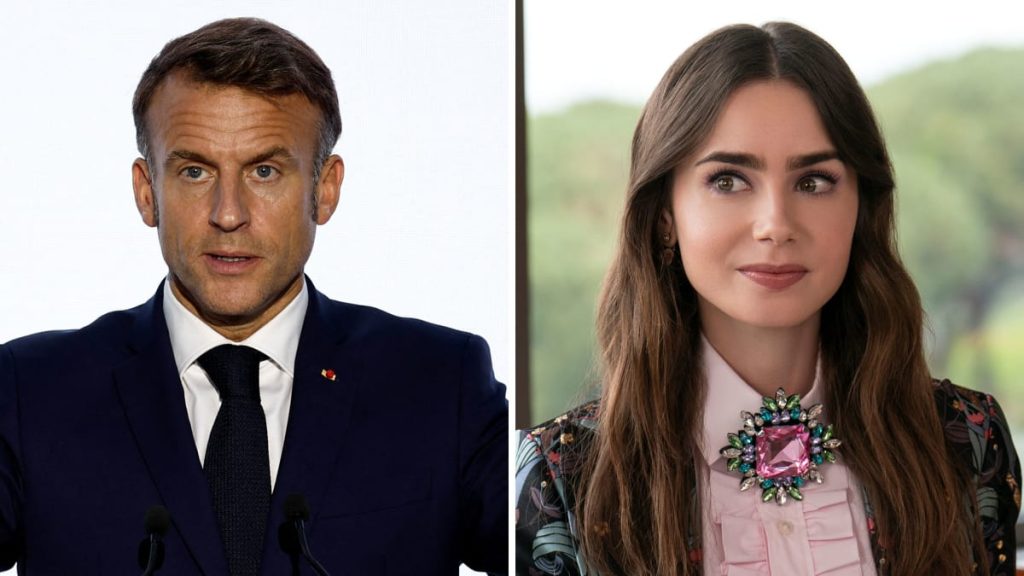Emmanuel Macron says France ‘will fight hard’ to keep hit Netflix show in Paris
3 min read

The future of Netflix’s beloved series “Emily in Paris” has stirred up quite the conversation, especially after the season four finale hinted that the lead character might be heading to Rome. French President Emmanuel Macron has now joined the fray, stating that France “will fight hard” to prevent the show from relocating to Italy’s capital.
In an interview with Variety, Macron expressed his determination, saying, “We will ask them to remain in Paris; ‘Emily in Paris’ in Rome doesn’t make sense.” His comments reflect a deep-rooted pride in the series, which showcases the charm and vibrancy of Paris, serving as a significant cultural ambassador for the city.
The show follows the adventures of Emily Cooper, a 20-something American marketing executive played by Lily Collins, who relocates from Chicago to Paris for a new job. The series captures her experiences navigating work, friendships, and romance in the picturesque French capital, making it a favorite among viewers. It consistently ranks among Netflix’s most-watched programs, highlighting its popularity and cultural impact.
When Netflix renewed “Emily in Paris” for a fifth season, creator Darren Star mentioned that Emily would “have a presence in Rome,” a revelation that left many fans wondering how this shift would affect the show’s narrative. Macron’s intervention signals the French government’s interest in maintaining the series in its original setting, which has become synonymous with its identity.
In response to Macron’s remarks, Rome’s mayor, Roberto Gualtieri, took to social media with a playful retort. He posted on X, “Dear Emmanuel Macron, don’t worry: Emily is doing great in Rome. And one can’t control the heart: let’s let her choose.” Gualtieri’s response underscores the lighthearted nature of the debate while also suggesting that the character’s journey should be left to her discretion.
Gualtieri further commented to The Hollywood Reporter, questioning whether Macron might have more pressing issues to focus on. “I would like to believe, at least I would like to hope, that Macron was joking, because he ought to know that a production company like Netflix does not take orders from heads of state or make decisions based on political pressure,” he said.
The exchange between Macron and Gualtieri illustrates the cultural significance of “Emily in Paris” and its role in promoting tourism and the allure of its respective cities. For Paris, the show has bolstered its image as a vibrant hub of fashion, food, and romance, while for Rome, the idea of expanding Emily’s adventures into its historical and romantic landscape presents a unique opportunity to attract a new audience.
As the discussions continue, it remains to be seen how Netflix will navigate this cultural tug-of-war. The streaming giant has a track record of incorporating diverse locations into its storytelling, and the potential for a dual-city narrative could open up fresh avenues for character development and plot twists.
While Macron’s passionate defense of Paris is clear, it reflects a broader concern for cultural identity and the influence of media in shaping perceptions of a city. As cities around the world vie for representation in popular culture, the debate over “Emily in Paris” serves as a reminder of the power of storytelling and its impact on tourism and national pride.
Ultimately, whether Emily Cooper stays in Paris or makes her way to Rome, one thing is certain: the love for both cities runs deep. As viewers await the next season, the dialogue sparked by Macron and Gualtieri adds an intriguing layer to the show’s evolving narrative. It highlights how television can intertwine with real-life cultural and political dynamics, creating a rich tapestry of storytelling that resonates with audiences across the globe.